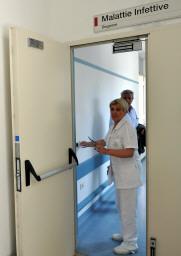Two more people have been diagnosed with H1N1 flu in Italy, bringing the number of confirmed cases to four, the health ministry said on Monday.
The two new cases are a 16-year-old girl and an 11-year-old boy, both of whom are being treated in hospitals in Rome after returning from Mexico.
Italy's first case of the flu - also known as influenza A - was confirmed on Saturday but the 50-year-old Tuscan man had already recovered from a very mild case of the virus by the time he was diagnosed.
A 25-year-old man, also recovered, was diagnosed on Sunday.
Both had just returned from trips to Mexico.
There have been no cases of person-to-person transmission in Italy so far.
The health ministry said on Monday the increase in cases had been ''expected''.
''There is no cause for particular concern,'' the ministry statement said.
''This is partly because the new virus produces less severe symptoms than seasonal flu and partly because Italy has enough stock of the drugs recommended for treating this infection, as well as enough distinguished centres able to admit and treat affected individuals''.
The ministry's higher health institute said it had tested ''over 20 samples'' so far.
It also confirmed a network of 27 laboratories had been set up around the country to collect and analyze further samples.
Health Undersecretary Ferruccio Fazio said on Saturday that 13 people had been confined to their homes for seven days and were ''under observation'' after displaying symptoms similar to H1N1 flu.
Updating global developments on Monday, the World Health Organization (WHO) said 1,003 cases of the flu had been officially reported across 20 countries, with person-to-person transmission confirmed in six countries.
Over 25 people in Mexico are known to have died from the virus.
Although the number of cases diagnosed in recent days has fallen, WHO chief Margaret Chan has warned against complacency and said the organization could still raise its alert system to the highest level, indicating a global pandemic.
Meanwhile, Italian Farm Minister Luca Zaia sought to reassure the public that pork was safe to eat, as prices plummeted in the wake of the scare.
''Pig meat has absolutely nothing to do with the flu, commonly called swine flu,'' the minister said, urging Italians to make the most of cheaper prices and buy in spare stocks of pork.
Pork prices have dropped by a third in Italy since before the scare, down from 1.5 euros a kilo to the current 1.055 euros.









